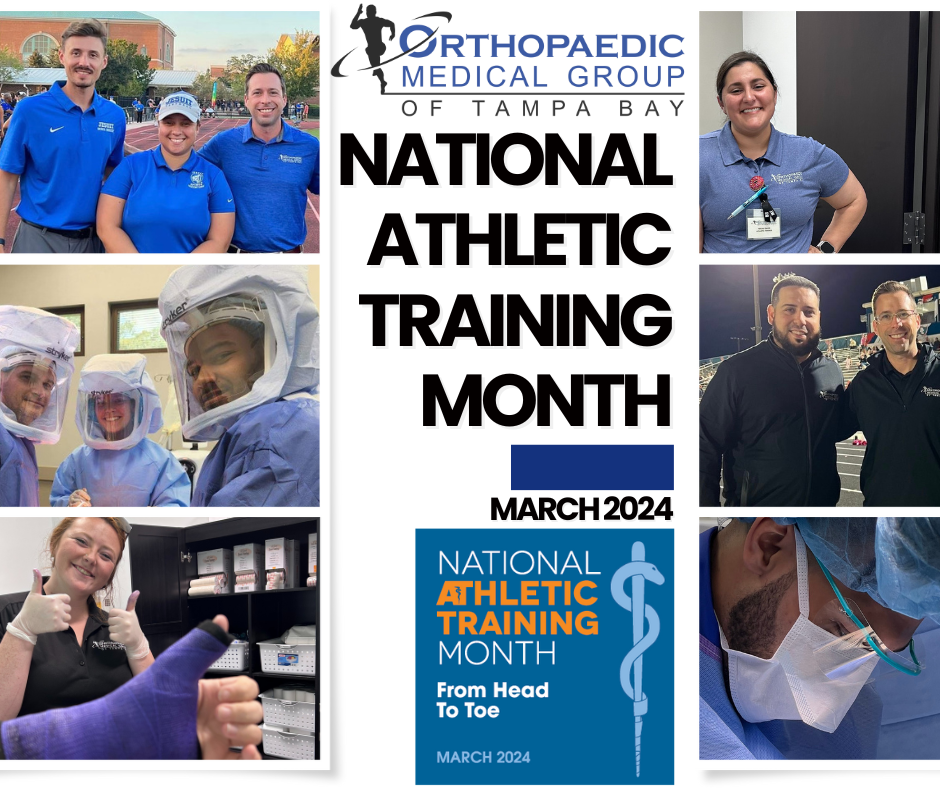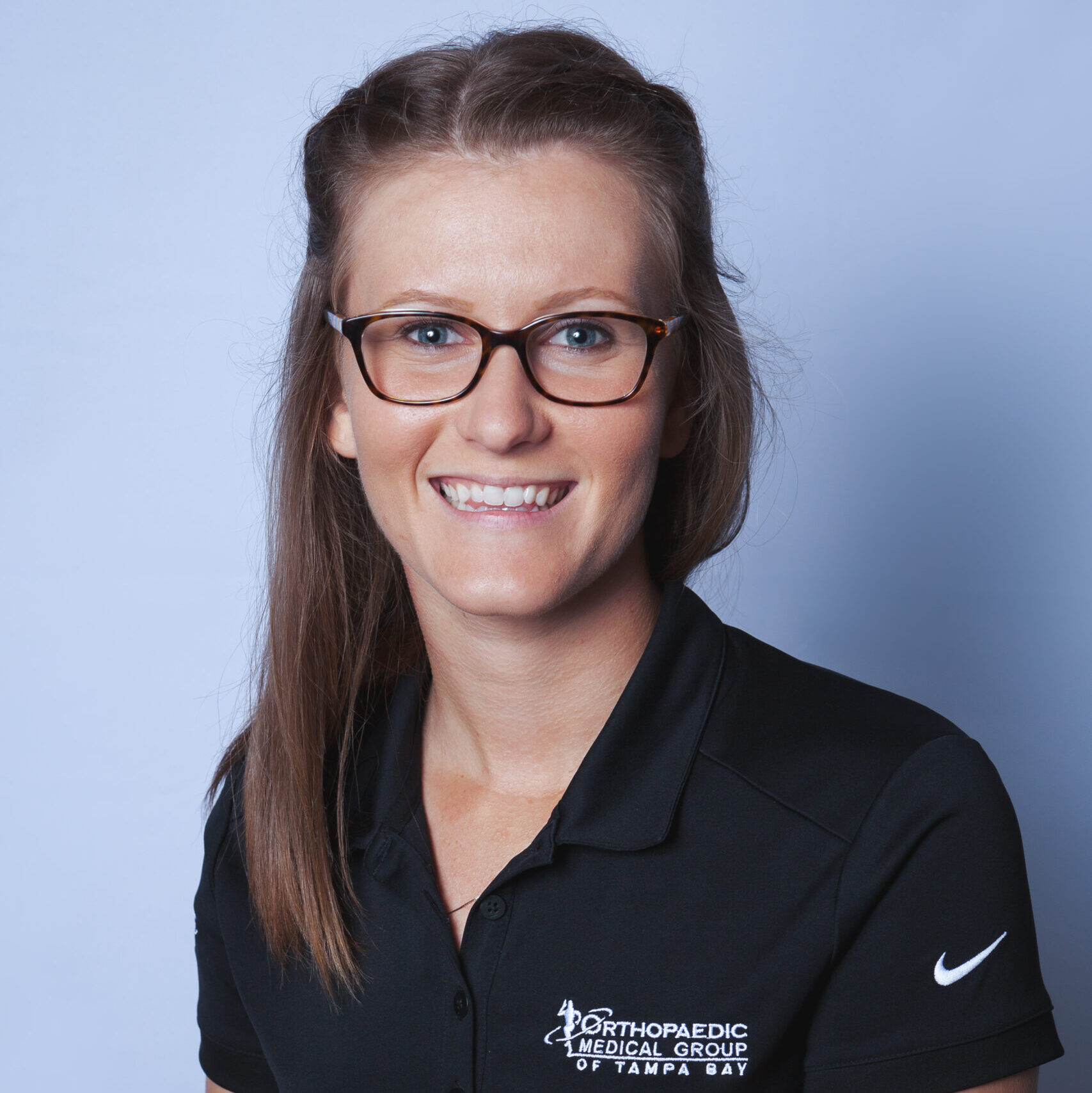
In the world of orthopaedics, there’s a group of dedicated professionals who often work behind the scenes, providing essential care to people of all ages- the athletic trainer. Athletic trainers (ATC) are certified and licensed healthcare professionals who play a crucial role in ensuring the health and well-being of athletes. As March marks National Athletic Training Month, it’s the perfect time to shine a spotlight on these invaluable members of the healthcare team.
What is an Athletic Trainer?
First and foremost, it’s essential to understand what sets athletic trainers apart from other healthcare professionals, particularly personal trainers. While personal trainers focus on fitness and exercise programs, athletic trainers are highly trained specialists in the prevention, assessment, treatment, and rehabilitation of injuries and illnesses related to physical activity. They work with people of all ages and skill levels, from high school teams and professional athletes to the everyday person, providing comprehensive care both on and off the field.
Education and Training
Becoming an athletic trainer requires a rigorous educational background and extensive clinical experience. Most athletic trainers now hold a master’s degree in athletic training with coursework covering topics such as anatomy, physiology, biomechanics, and injury prevention. Additionally, athletic trainers must complete a comprehensive clinical internship under the supervision of experienced professionals to gain hands-on experience in a real-world setting.
After completing their education, aspiring athletic trainers must pass a rigorous certification exam administered by the Board of Certification for Athletic Trainers (BOC). This certification ensures that athletic trainers possess the knowledge and skills necessary to provide high-quality care to athletes.
Furthermore, athletic trainers must maintain their certification as well as state licensure through continuing education and professional development to stay up-to-date on the latest advancements in sports medicine and injury prevention techniques.
Utilization in Orthopaedic Clinics
In orthopaedic clinics, athletic trainers are invaluable members of the healthcare team, working alongside physicians, physical therapists, and other healthcare professionals to provide comprehensive care to patients. Their unique skill set allows them to assist with a wide range of tasks, including:
- Injury Assessment and Rehabilitation: Athletic trainers are trained to assess and diagnose musculoskeletal injuries, allowing them to develop personalized treatment plans tailored to each patient’s needs. They work closely with physicians and physical therapists to coordinate care and monitor progress throughout the rehabilitation process.
- Preventive Care: One of the primary roles of athletic trainers is to prevent injuries before they occur. They educate athletes on proper conditioning techniques, injury prevention strategies, and safe training practices to minimize the risk of injury during physical activity.
- Assistance in the Operating Room: Some athletic trainers go through specialized training and residencies to be able to aid your surgeon in the operating room. Having a consistent support system in the OR allows your surgeon to work efficiently and deliver the best care possible.
- Emergency Response: In the event of an on-field injury or medical emergency, athletic trainers are often the first responders on the scene. Their training in emergency medicine equips them to quickly assess the situation, provide immediate care, and coordinate further medical treatment as needed.
- Sideline Support: Athletic trainers play a crucial role in ensuring the safety of athletes during sporting events. They provide on-site medical care, injury evaluation, and concussion management, allowing athletes to receive prompt treatment and return to play safely.
- Collaborative Care: Perhaps most importantly, athletic trainers collaborate closely with physicians, physical therapists, and other healthcare professionals to ensure continuity of care for patients. By working together as a cohesive team, they can provide the highest level of care and support to athletes throughout their recovery journey.
Benefits to Patients
The utilization of athletic trainers in orthopaedic clinics offers numerous benefits to patients, including:
- Expertise and Specialized Care: Athletic trainers bring specialized knowledge and expertise in sports medicine, allowing them to provide personalized care tailored to the unique needs of athletes.
- Faster Recovery: By providing prompt assessment, treatment, and rehabilitation services, athletic trainers help expedite the recovery process and facilitate a quicker return to play for injured athletes.
- Injury Prevention: Through education and preventive measures, athletic trainers help athletes minimize the risk of injuries, allowing them to stay healthy and active for longer periods.
- Comprehensive Care: By working closely with physicians and other healthcare professionals, athletic trainers ensure that patients receive comprehensive care that addresses all aspects of their injury or condition.
- Peace of Mind: Knowing that they have a dedicated healthcare professional on their side, athletes and their families can have peace of mind knowing that they will receive the highest level of care, both on and off the field.
Other Settings Where Athletic Trainers Are Widely Utilized
While most athletic trainers commonly work in high school, college, professional sports, or in the clinic setting, they also play a part in performing arts, public safety, and occupational health. They are also widely used within the US Military to assist with injury prevention.
In conclusion, athletic trainers are indispensable members of the healthcare team, providing essential care to athletes and patients alike. Their dedication, expertise, and passion for helping others make them a key player in our practice with Orthopaedic Medical Group of Tampa Bay. As we celebrate National Athletic Training Month this March, let’s take a moment to recognize and appreciate the invaluable contributions of athletic trainers to the health and well-being of patients everywhere.

Hayley is a BOC Certified Athletic Trainer and State of Florida Licensed Athletic Trainer. She graduated with a bachelor’s degree in Athletic Training from Palm Beach Atlantic University in 2017 and is working on a master’s degree in Health Administration through St. Augustine University. In addition to working with our physicians she often works in our physical therapy department where she uses her certification in Graston, a soft tissue mobilization technique to help with soft tissue recovery. Full Bio




